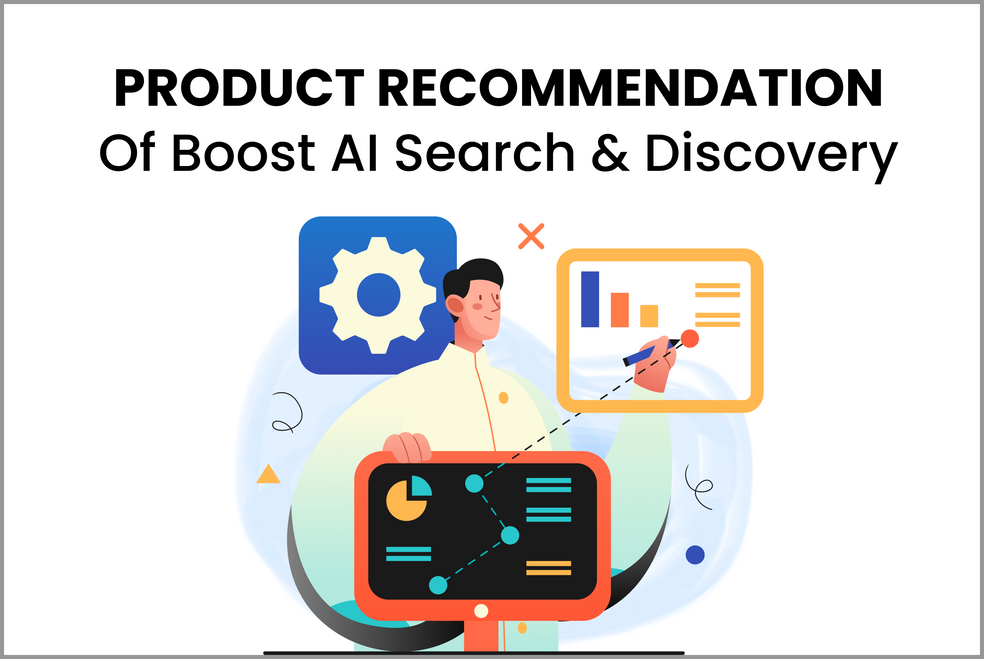What is Natural Language Search?
A natural language search uses plain and commonly spoken language, like a customer’s everyday language.
With natural language search, you can ask the database a question or enter a sentence that briefly summarizes the data you’re looking for. The database then employs programmed logic to identify the sentence’s keywords based on where they are within the text.
Why is Natural Language Search important for your Shopify site search?
Natural Language Search increases your sales by converting more visitors
Consumers frequently go shopping in search of unique products. They want to be able to use natural language search in all of their favorite online services.
Customers would rather not have to adjust search parameters manually. They would rather follow a direct line from their initial question to the desired purchase.
In fact, according to a poll conducted by MarketingCharts, 28% of consumers report that unrelated product searches are their main source of frustration, while 18% report feeling the same way when the search engine fails to interpret their inquiries properly.
Natural language understanding (NLU) is the key to unlocking these barriers.
They need to know the specific name of the products or their specifications to avoid using natural language to locate the product they seek. It means that the customer’s time spent researching a product will be much less and increase the likelihood of a sale.
Natural Language Search simulates Google-like search results
At this time, the single most crucial action that online merchants can take is to adapt to the new shopping habits of their customers.
It would be best to have an NLU that is easy to use and gives shoppers accurate results. When you do, you’ll be able to provide them with what they want in a way that would be faster, more precise, and more dependable than Google’s search results.
Natural Language Search increases customer retention
Customer retention is NLU’s primary value. Customers who get answers to their inquiries smoothly are more inclined to make repeat purchases. You’ll be able to keep your clients coming back for more if you can “read their minds,” so to speak.
Natural Language Search increases your average order value (AOV)
Natural Language Search helps boost your sales by recommending products to customers based on their preferences.
Most consumers don’t shop with a specific product or version in mind. People are less likely to search for “blue shoes” or “pink clothing” and click through every category until they discover a match than you might think.
Examples of Natural Language Search
Voice search
Customers can use voice search to look for products without typing anything in. People utilize everyday speech while conducting a voice search.
Therefore this is a natural place for a natural language search to take root. On the other hand, voice search is divisive because some experts think it will benefit online shopping while others are less optimistic.
On the contrary, they contend that people are not using it to its full potential and that this trend will shift soon.
Predictive text
Autocorrect, autocomplete, and predictive text are features we rarely consider since they are ubiquitous on our devices. Comparable to search engines, autocomplete and predictive text complete incomplete words or propose related alternatives as you enter.
In rare cases, autocorrect will even replace individual terms to improve the flow of the sentence. And you teach them, too! The more you use predictive text, the more it will adapt to your unique speech patterns. They share full sentences crafted from their phone’s predictive text, making for interesting thought experiments.
Chatbots
eCommerce chatbots are like virtual assistants who can answer customers’ questions and fulfill their orders. They can also recommend products or help customers with problems.
And, of course, they use artificial intelligence and natural language processing to keep up the meaningful conversation with the customers.
Natural language search vs. keyword search
Users are used to doing keyword searches now that Google and other services like it are so popular. Consumers need to improve at using keyword searches to get what they need, and keyword searches aren’t easy for users to ask questions.
They have people eliminate question words and other connective languages in favor of more literal strings of text that the search engine can use to query information. The company needs to extract meaningful results from keyword searches.
Even though most keyword search systems can handle compound queries, users usually have to build more complex queries by hand. Instead of asking, “What’s a vegetarian recipe with tomatoes and cheese?” you would be expected to look for a “vegetarian recipe” with tomato cheese.
But now that digital voice assistants like Siri and Alexa are becoming more common; people are getting used to having in-depth conversations with their devices, complete with big words.
This behavior has led to a rise in the number of users formulating questions in the form of queries across various interfaces. Users have come to expect that they can use everyday language to ask questions and get answers quickly. So, all search systems must start letting people use natural language when they type in queries.
Best Practices to Optimize for Natural Language Search
Many websites put too much emphasis on search engine optimization (SEO) and need more on user experience when tailoring their sites for natural language search. In the end, though, natural language search’s purpose is to give users a more pleasant, informative, and exciting way to navigate the web.
The following are some guidelines for creating an excellent user experience:
1. Create a voice-activated search engine that narrows the needles in the haystack
Search engines need to use every bit of data and context. Information such as a person’s profile and search history can be useful in predicting what a user is looking for.
The search engine can figure out what you mean based on the context. It would be beneficial if your voice search could be clearer. Also, filtering indexed data by user categories can help narrow searches and get more relevant results.
2. Do your homework and learn how people conduct “conversational searches.”
Even though natural language processing systems are good at understanding big ideas, most companies will find that there are details in their industries or fields that need more attention.
You can see trends in user queries by constantly looking at and analyzing user queries, which lets models be tweaked to fit those trends.
3. Perform organic search engine optimization tests on the site’s content
You should construct your website content so that natural language search engines can accurately match questions and analyze search accuracy.
You can check how the information ranks using typical search queries and gradually tweak the content to see how it affects the results.
4. Make your site’s content accessible using a common language and focusing on user needs.
You can better answer your users’ questions and meet their demands if you write in a conversational tone. Adding a frequently asked questions (FAQ) section or separate page for frequently asked questions that aren’t answered directly in the material can be helpful for users to find the answers they’re looking for.
In conclusion, making a site that works well with natural language search requires using data to give search context, fine-tuning search algorithms and filters to the specific business domain, and organizing site content in a way that works well with conversational search patterns. Follow these steps to help your customers get used to the new conversational interface on your website.
















